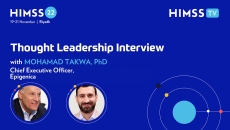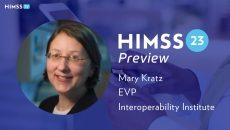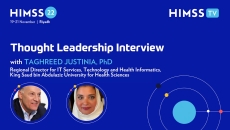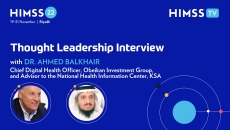HIMSS TV
In his upcoming HIMSS23 panel, Dr. Robert Murry, chief medical officer at NextGen Healthcare, will focus on using technology to deliver coordinated care to patients via street medicine.
The Ellison Institute is working to create a nationwide enterprise architecture for health data that includes clinical, public health and social determinants. Gabriel Seidman, the institute's director of policy, explains.
The technology offers opportunities for care delivery and drug development, says Mohamad Takwa, CEO of Epigenica, a Swedish company that focuses on epigenetic profiling.
In a preview of his upcoming HIMSS23 session, Judd Hollander, SVP of healthcare delivery innovation at Thomas Jefferson University explains why provider organizations need to elevate virtual care not as an enabler of strategy, but as a strategy in itself.
In this HIMSS23 preview, Mary Kratz, executive vice president at the Interoperability Institute, previews the panel she'll lead on cross-sector challenges to interoperability and the power of open-source solutions.
Predictive analytics are helping advance detection and improve patient communication, says J. Tod Fetherling, managing director at Huron, who previews the discussion he'll lead at HIMSS23.
The G20 Riyadh declaration aligned recommendations with the World Health Organization's Global Strategy on Digital Health. Taghreed Justinia, regional director for IT Services at King Saud bin Abdulaziz University for Health Sciences, explains.
Dr. Peter Bonis, CMO at Wolters Kluwer Health, discusses what was learned from donating UpToDate to middle- and low-income countries. One takeaway: Access to evidence-based clinical guidance can reduce health barriers anywhere.
The nation is focusing on improving the output of care and quality outcomes by steering toward value-based models, says Dr. Ahmed Balkhair, chief digital health officer at Obeikan Investment Group and advisor to the National Health Information Center.
Medical professionals around the world are employing immersive technologies such as artificial intelligence and extended reality to improve healthcare, says Dr. Sana Farid, a Bahrain-based general surgeon.










